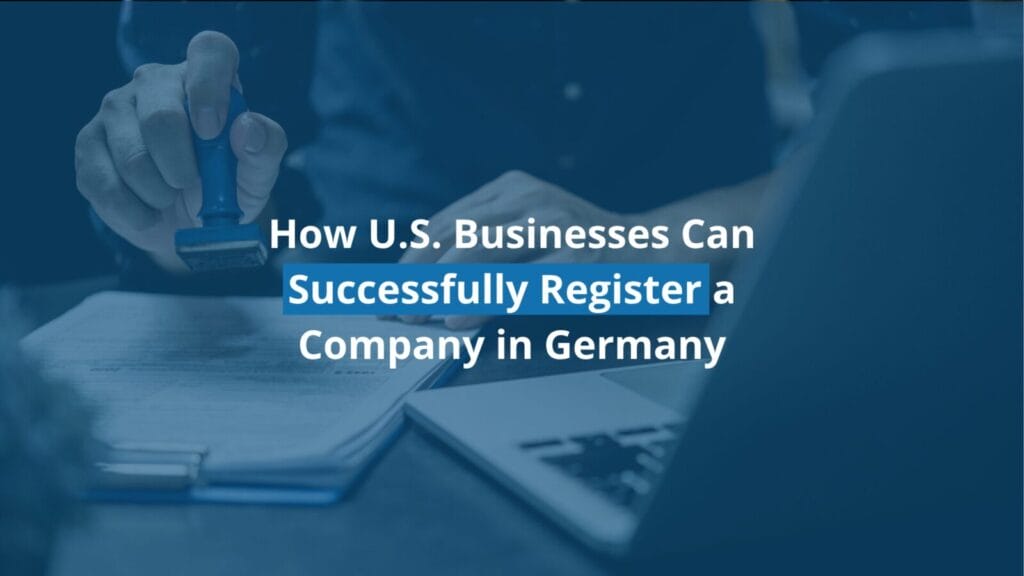Do You Need a Legal Entity in Germany?
Before starting the company registration process in Germany, evaluate whether your business model requires a local legal entity. If you’re running a B2C e-commerce business, you may not need to incorporate in Germany. Registering for EU VAT and appointing a local representative may suffice. However, creating a local entity, such as a GmbH, can be beneficial or necessary for:
- B2B transactions where German business partners prefer dealing with local entities
- Stronger consumer trust and reputation, especially for high-ticket B2C offerings
- Legal or regulatory compliance in certain industries
Choosing the Right Legal Structure: GmbH vs. UG
The most common legal form for private companies in Germany is the GmbH (Gesellschaft mit beschränkter Haftung). It requires a minimum capital of €25,000. If capital is a concern, startups often opt for a UG (Unternehmergesellschaft), also known as a ‘Mini-GmbH’. The UG can be formed with as little as €1 but comes with more restrictions. It is designed to evolve into a GmbH as profits accumulate.
Step-by-Step: How to Register a Company in Germany
Here’s a practical overview of the process:
- Find a company name and check availability with the local IHK (Chamber of Commerce) and trademark registers (Germany, EU, US).
- Draft your Articles of Association and determine an office address.
- Schedule a notarial appointment – mandatory for incorporation in Germany.
- Open a business bank account using the notarial documents.
- Deposit the required share capital (€25,000 for GmbH, €1+ for UG).
- Notify the notary with the proof of capital deposit; the notary files for registration in the commercial register.
- Once registered, apply for a tax number with the tax office (they will contact you with a questionnaire), a Gewerbeanmeldung (business license), and register with the Transparency Register.
Timelines and Alternatives
Compared to the U.S., the registration process in Germany can be slow and bureaucratic. Expect:
- 4 to 6 weeks if starting from scratch. Longer delays are possible depending on
- how fast you can get a notary appointment (a well-connected lawyer will help you secure an appointment faster) and
- whether there’s a backlog at the commercial register.
- 1 to 2 weeks if you’re acquiring a pre-registered shelf company – but beware: extra diligence is needed to avoid hidden administrative pitfalls or legal liabilities.
Start Your Expansion Now
We help you launch and grow in Germany and Europe with smart, bilingual legal support – designed for U.S. companies like yours.
Key Considerations for U.S. Businesses
There are notable differences between German entities (GmbH/UG) and U.S. LLCs and Corporations. These include, amongst others:
- Tax Treatment: GmbH/UG profits are taxed at the corporate level, like US corporations. US LLCs, by contrast, are flow-through entities for taxation purposes, unless they elect to be taxed as corporations. This means that profits are not taxed at the LLC level but at the level of the individual LLC member.
- Public Filing: GmbHs and UGs must publish annual financial statements, which become publicly available. In the U.S., this is typically not required for private companies (neither LLCs nor Corporations).
- Formality and liability: German managing directors (Geschäftsführer) face stricter personal liability and compliance obligations compared to U.S. officers.
Continuing Obligations
Once formed, GmbHs and UGs must:
- File annual financial statements (potentially audited based on size)
- Register for social security and accident insurance if employing staff
- Maintain an active office address
Tips for a Smooth Registration
To navigate the process more efficiently:
- Engage a lawyer experienced in cross-border setups to guide you through the process of acquiring a shelf company or starting a UG or GmbH, expedite notary appointments, help you find the right tax adviser, and ensure compliant documents.
- Work with a tax advisor and, if needed, a payroll provider for registering with tax and social security administrations.
- Be cautious with fraudulent letters posing as official correspondence once your company is registered.
Conclusion
Registering a company in Germany is more formal and time-consuming than in many U.S. states, but it provides real advantages for your European market entry: legal certainty, “home turf’ advantages and better reception by consumers and partners (from business partners to banks and public authorities), and a strong entry to the massive EU market. With the right guidance and preparation, even the more bureaucratic parts of German company law become manageable—and worthwhile.
